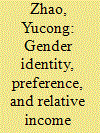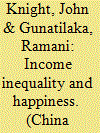| Srl | Item |
| 1 |
ID:
163339


|
|
|
|
|
| Summary/Abstract |
Using the Chinese Household Finance Survey data set, the study shows that concern with relative income significantly stimulates poor households to apply for bank credit. The effect of income comparisons on credit applications can be explained by either a “keeping up with the Joneses” effect, in which the poor seek financing for costly consumption to emulate the wealthy's consumption style and thus suffer persistent poverty, or else a “tunnel” effect, in which the poor are inspired by the wealthy's economic success and enlightened to use credit for investment. Although this study provides no empirical evidence of a “keeping up” effect, it reveals that credit applicants invest significantly more in human capital than non-applicants, and it demonstrates that the “tunnel” effect is the primary incentive for relatively poor households to participate in the credit market. Poor households are capable of using finance to escape from poverty.
|
|
|
|
|
|
|
|
|
|
|
|
|
|
|
|
| 2 |
ID:
187813


|
|
|
|
|
| Summary/Abstract |
In this paper, we empirically study the impact of gender identity on wives' relative income within households in China and find that a husband's and a wife's traditional gender identity statistically significantly and negatively affect the wife's relative income in the household. The heterogeneous effects of gender identity for different residence types, education levels, and age groups are also studied. Supporting empirical evidence is explored for the preference mechanism that couples with traditional gender identities are more averse to having a wife who earns more than her husband. We also find that a husband earns less if the husband or the wife has a traditional gender identity.
|
|
|
|
|
|
|
|
|
|
|
|
|
|
|
|
| 3 |
ID:
187843


|
|
|
|
|
| Summary/Abstract |
The effect of inequality on happiness should intrigue social scientists. Of the many dimensions of income inequality, we explore four, analysing a rich data set for China. Does actual or perceived inequality have a greater effect on happiness? We find that perceptions of inequality are the more important. How broad is the reference group with which people compare themselves? They report that it is narrow; and indeed narrowly defined inequality has the greater effect on happiness. Do perceptions of the degree of fairness of inequality matter? They do, as they ameliorate the adverse effect of inequality on happiness, especially for the poorest. Is it self-centred or community-based inequality which affects happiness? Both measures have significant effects, but in opposite directions. The research and policy implications are discussed.
|
|
|
|
|
|
|
|
|
|
|
|
|
|
|
|
| 4 |
ID:
184121


|
|
|
|
|
| Summary/Abstract |
Using three definitions of the middle class (MC) and the Pakistan Social and Living Standards Measurement surveys from 2004 to 2014, we estimated the size of the MC and examined the correlates and consumption patterns of the MC for Pakistan. According to the absolute income, relative income and asset–ownership definitions, the MC grew by 16%, 8%, and 10%, respectively, from 2004 to 2014. The results of the biprobit model showed that the probability of entering the MC was associated with higher education, urban residence and non-agricultural employment. Additionally, the MC was associated with greater consumption of ordinary and luxury goods.
|
|
|
|
|
|
|
|
|
|
|
|
|
|
|
|